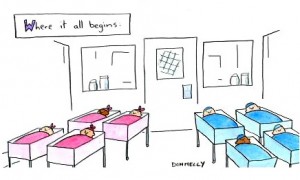Looking for that perfect go-to gift for the wonky feminist mama in your life? Look no further. Your online guide to all things research-and-resource is here. Well, ok, it’s a partial list. Feel free to add suggestions in comments or tweet them at me (I’m @deborahgirlwpen) and I will share. Here’s a start:
1. A book (of course) to help her navigate feminist motherhood. Topping my personal list this season are two by colleagues 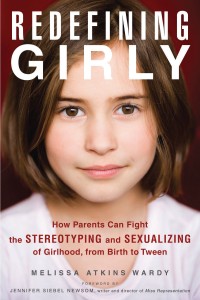 from the Brave Girls Alliance, a gender equality think tank and advocacy group I’m part of that’s dedicated to communicating with and influencing media, corporations, and retailers. First up, Redefining Girly: How Parents Can Fight the Stereotyping and Sexualizing of Girlhood, from Birth to Tween by Melissa Atkins Wardy, my neighbor to the north. You can read an excerpt here, purchase apparel and gifts for “full of awesome” girls and boys that go beyond gender stereotypes at Pigtail Pals and Ballcap Buddies, and join an incredibly active Facebook community over at Wardy’s page.
from the Brave Girls Alliance, a gender equality think tank and advocacy group I’m part of that’s dedicated to communicating with and influencing media, corporations, and retailers. First up, Redefining Girly: How Parents Can Fight the Stereotyping and Sexualizing of Girlhood, from Birth to Tween by Melissa Atkins Wardy, my neighbor to the north. You can read an excerpt here, purchase apparel and gifts for “full of awesome” girls and boys that go beyond gender stereotypes at Pigtail Pals and Ballcap Buddies, and join an incredibly active Facebook community over at Wardy’s page.
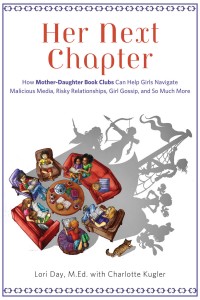 Next, Her Next Chapter: How Mother-Daughter Book Clubs Can Help Girls Navigate Malicious Media, Risky Relationships, Girl Gossip, and So Much More, hot off the press, by Lori Day, M.Ed., and her daughter, Charlotte Kugler, a student at Mt. Holyoke. Covering far more than the significance of book groups, the book hits on eight of the biggest challenges facing girls today, including bullying, gender stereotypes, and negative body image. The authors provide tools and strategies for discussing these thorny topics, providing carefully chosen books, movies, media recommendations, discussion questions, and group activities to go along with each.
Next, Her Next Chapter: How Mother-Daughter Book Clubs Can Help Girls Navigate Malicious Media, Risky Relationships, Girl Gossip, and So Much More, hot off the press, by Lori Day, M.Ed., and her daughter, Charlotte Kugler, a student at Mt. Holyoke. Covering far more than the significance of book groups, the book hits on eight of the biggest challenges facing girls today, including bullying, gender stereotypes, and negative body image. The authors provide tools and strategies for discussing these thorny topics, providing carefully chosen books, movies, media recommendations, discussion questions, and group activities to go along with each.
And while we’re on it, The Good Mother Myth: Redefining Motherhood to Fit Reality, edited by Avital 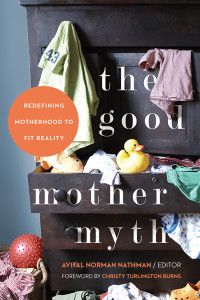 Norman Nathman, is practically a Mother’s Day standard, as is pretty much any title from She Writes Press, Seal Press, or The Feminist Press – three very different presses whose lists include high-quality works on a range of topics related to gender.
Norman Nathman, is practically a Mother’s Day standard, as is pretty much any title from She Writes Press, Seal Press, or The Feminist Press – three very different presses whose lists include high-quality works on a range of topics related to gender.
2. An experience to massage her mind. Why not gift a mama a slot in The OpEd Project’s Write to Change the World seminar, coming up next in Atlanta, Chicago, LA (where I’ll be teaching it on June 1), NYC, Boston, San Francisco, Tucson, and DC. And for Chicago-area locals, how about a ticket to Women Employed’s Working Lunch gala event.
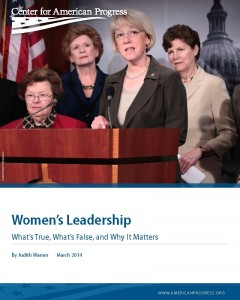 3. A savvy report for her to curl up with at the end of the day. Hey! This one’s FREE! Gift her the newly released report “The Economic Importance of Women’s Rising Hours of Work: Time to Update Employment Standards” by the Center for Economic and Policy Research’s Eileen Appelbaum, Heather Boushey, and John Schmitt, which Schmitt wrote about here.
3. A savvy report for her to curl up with at the end of the day. Hey! This one’s FREE! Gift her the newly released report “The Economic Importance of Women’s Rising Hours of Work: Time to Update Employment Standards” by the Center for Economic and Policy Research’s Eileen Appelbaum, Heather Boushey, and John Schmitt, which Schmitt wrote about here.
Or send her Judith Warner’s new report from the Center for American Progress, “Women’s Leadership: What’s True, What’s False, and Why It Matters,” which explores the “silver lining” to exclusion. (Hint: women, long outsiders, have had no choice but to think, act, and lead in out-of-the-box ways, which is why they’re now poised to change our institutions for the better.)
4. Music, jewelry, pjs, a yoga class, or any of the myriad gifts available  from the online shop run by Every Mother Counts, where part of the proceeds go to help mothers around the world.
from the online shop run by Every Mother Counts, where part of the proceeds go to help mothers around the world.
5. A magazine or movie to feed her brain. How about a subscription to Brain, Child magazine, or the DVD of the documentary, “Who Does She Think She Is?“, about conflicts between motherhood, work, and art. ‘Nuf said. 
Of course, no need to wait for Mother’s Day, or limit such gifts to mothers. Thinking back to Julia Ward Howe’s call for a Mother’s Day of Peace, come Sunday, here’s wishing all GWP readers and bloggers an equitable and sincerely peace-filled day.
I invite you to follow me on Twitter and Facebook and subscribe to my occasional newsletter to keep posted on coaching, workshops, writings, and talks.

